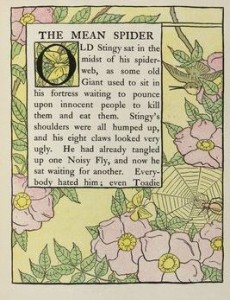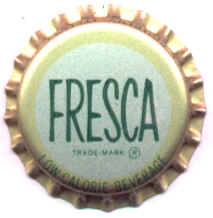The Wall Street firm stars in Michael Moore’s attack on capitalism — and also bankrolled his producers. [Ira Stoll, Future of Capitalism]
Archive for September, 2009
“Bank of America Sued for 1.784 Sextillion Dollars”
Because a quadrillion just doesn’t sound like real money any more [Reuters via Lowering the Bar]. “If [complainant Chiscolm] thinks Bank of America has branches on every planet in the cosmos, then it might start to make some sense.”
September 25 roundup
- “Highly embarrassing …ugly”: Florida Justice Association apologizes for race-baiting mailer intended to sway state senate race [Miami Herald, Orlando Sentinel]
- Fanny-state regulation: they wouldn’t really ban soft toilet paper, would they? [Washington Post via Logomasini, CEI “Open Market”]
- Update on David Michaels OSHA nomination [Carter Wood, PoL] More: Fox News.
- Library of Congress has expanded its law research website, includes archiving project for legal weblogs including this one;
- David Leonhardt, NYT economics columnist, looks at defensive medicine debate [“Economic Scene”]
- “Republicans denounce identity politics, except when they engage in it themselves.” [Heather Mac Donald, Secular Right]
- Aw: Ron Coleman recalls “one of my proudest weeks of blogging”. [Likelihood of Success]
- Dewey Decimal System owner sues NYC’s Library Hotel [six years ago at Overlawyered — link fixed now]
CPSIA: “The Waiting Game Continues for Libraries”
Karen Raugust, Publisher’s Weekly, on some recent clarification (not exactly relief) for makers and sellers of new books under the Draconian law:
The Consumer Products Safety Commission recently issued a final lead rule that deemed many—but not all—of the components in ordinary children’s books safe. …
Most ink-on-paper and ink-on-board books will not have to undergo testing under various CPSC rulings. (Some so-called “ordinary” books, such as those with gold foil or spiral bindings, must be tested, and big retailers may require testing even when the CPSIA doesn’t.) All novelty and book-plus formats for children 12 and under must be tested by independent labs.
 However, the CPSC has yet to issue promised guidance to libraries on pre-1985 books:
However, the CPSC has yet to issue promised guidance to libraries on pre-1985 books:
Thom Barthelmess, president of the Association for Library Service to Children, a division of the American Library Association, says most librarians are waiting to see what happens. “We’re hoping for a happy resolution, so our collections aren’t decimated,” he says. If the CPSC’s ruling results in libraries needing to pull books from shelves, “there would be huge ramifications,” he continues. “If we lose a lot of titles printed before 1986, many of which are irreplaceable, it would have a huge impact on the nature of our collections.”
We’ve linked the coverage in Publisher’s Weekly several times over the course of the year but overlooked this report from March:
Most booksellers are now comfortable selling ordinary paper children’s books printed in 1986 and beyond. …
Half Price [Half Price Books, a large chain] removed all book-plus items from the shelves in every store and is warehousing them while it researches how to dispose of them in a safe and environmentally sound way, perhaps at a hazardous waste site.
And an official of the Independent Online Booksellers Association told PW in March that most members of the association were positioning their vintage children’s books as adult collectibles, which supposedly reduces legal risk, though as we noted in February, “the law provides that [retailers] are liable if they sell a product which will commonly be understood as destined for use by children, whether or not they label it as such.” Deputy Headmistress in February and Valerie Jacobsen in March also explained more about the practical drawbacks of the “relabel as collectibles” dodge, as has Elizabeth Mullaney Nicol more recently.
P.S. And welcome listeners at Hartford’s WTIC, where host Ray Dunaway had me as a guest on his show this morning to discuss the law. You’ll find much more here.
PUBLIC DOMAIN GRAPHIC: Edith Brown, illustrator, Jeannette Marks, The Cheerful Cricket and Others (1907), courtesy The Children’s Library.
U.K.: hyperactive kids given queue-jump passes
Because having to wait in the regular line for a ride at the amusement park might be too stressful. A note from a doctor is needed. [Daily Mail]
Hurry, get those lawsuits filed before reform
Oklahomans have been here before, notes Dustbury [earlier]
Connecticut soup kitchen, cont’d
Updating our August 21 item: The Health Department in Middletown, Connecticut issued a “citation against St. Vincent DePaul Place on Tuesday for accepting some donated food from unlicensed kitchens.  The department has asked the nonprofit group, which runs a soup kitchen, to comply with the health code by accepting food that comes only from licensed kitchens.” [Middletown Eye] The state’s attorney general, Richard Blumenthal, is asking the legislature to loosen rules for charitable kitchens. [Hartford Courant] We covered the Connecticut pie menace nearly ten years ago [Dec. 13, 1999] and have since noted legal crimps put on cookies for troops, church potlucks, and much more.
The department has asked the nonprofit group, which runs a soup kitchen, to comply with the health code by accepting food that comes only from licensed kitchens.” [Middletown Eye] The state’s attorney general, Richard Blumenthal, is asking the legislature to loosen rules for charitable kitchens. [Hartford Courant] We covered the Connecticut pie menace nearly ten years ago [Dec. 13, 1999] and have since noted legal crimps put on cookies for troops, church potlucks, and much more.
September 24 roundup
- Florida man and attorney file multiple ADA complaints against businesses in Seminole-Largo area [Tampa Bay Newspapers]
- “The growing ambitions of the food police”:
 dietary paternalism in Bloomberg’s NYC and Washington, D.C. doesn’t go over well with writers at Slate [William Saletan, Jacob Weisberg, Katherine Mangu-Ward, Glenn Reynolds]
dietary paternalism in Bloomberg’s NYC and Washington, D.C. doesn’t go over well with writers at Slate [William Saletan, Jacob Weisberg, Katherine Mangu-Ward, Glenn Reynolds] - Assumption of risk is alive and well in New York cases over sports and spectator injuries [Hochfelder first, second, third posts, NYLJ]
- Favorable review of William Patry, “Moral Panics and the Copyright Laws” [BoingBoing]
- Kentucky high school case: “Coach Acquitted in Player’s Heatstroke Death” [ABA Journal]
- Olivia Judson on the Singh case and the many problems with British libel law [NYT; earlier here, here, etc.]
- Kids behave stupidly with girlfriends/boyfriends or dates, then the law ruins their lives [Alkon, Balko, Sullivan]
- “Report a bad doctor to the authorities, go to jail?” [Orac/Respectful Insolence, Texas; disclosure of patient and official information alleged against nurses]
Houston: Hoeffner trial in fifth week
“Houston lawyer Warren Todd Hoeffner is accused of paying $3 million in cash, BMWs, trips, even spa treatments and ‘gentleman’s entertainment’” in a scheme to obtain $34 million in settlements in silicosis litigation. Things began to unravel when Hartford Insurance, which had cut settlements on behalf of a number of defendants, noticed the arrival of a check for $6,000 from Hoeffner to one of its former claims personnel. Hoeffner’s lawyers are arguing that the insurance company employees extorted money and goods from their client by threatening not to approve fair settlements otherwise. [Houston Chronicle, Southeast Texas Record]
Are high-occupancy toll lanes racist?
That’s one claim in a lawsuit by the government of Arlington, Virginia against such a plan. The chair of the county board says the issue never came up in county discussions and “only arose [in the lawsuit] because the environmental review includes socioeconomic impact”. [MyFoxDC via Below the Beltway]
